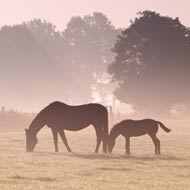
Bill gives landowners and local authorities greater powers
A bill to tackle fly-grazing has come into force in England, bringing the country into line with Wales, where similar legislation was introduced last year.
Under the new Control of Horses Act, landowners and local authorities have greater powers to remove horses being fly-grazed illegally. Landowners are now only required to keep such horses on their land for four days, rather than the previous two weeks.
More options are now available for removing fly-grazed horses, aside from public sale. They can now be gifted to a charity, privately sold or humanely euthanised if appropriate.
The new legislation is the result of a private members' bill by Julian Sturdy, MP for York Outer. Similar legislation brought in by the Welsh Government is thought to have exacerbated the problem of fly-grazing in England.
“This law will make a big difference to horse welfare as landowners can more quickly deal with fly-grazing animals, instead of them having to leave them on unsuitable land without grazing, shelter or additional food, which is all too often the case," commented David Bowles, the RSPCA's assistant director of public affairs.
Charities estimate there are around 3,000 horses being fly-grazed in England. Such horses are often left to fend for themselves without sufficient food, water and shelter, making them vulnerable to serious and preventable diseases. Often the land lacks suitable fencing around the perimeters meaning horses can escape onto busy roads and motorways.



 The veterinary mental health charity Vetlife is inviting the veterinary community to join it for a sponsored cold-water dip.
The veterinary mental health charity Vetlife is inviting the veterinary community to join it for a sponsored cold-water dip.